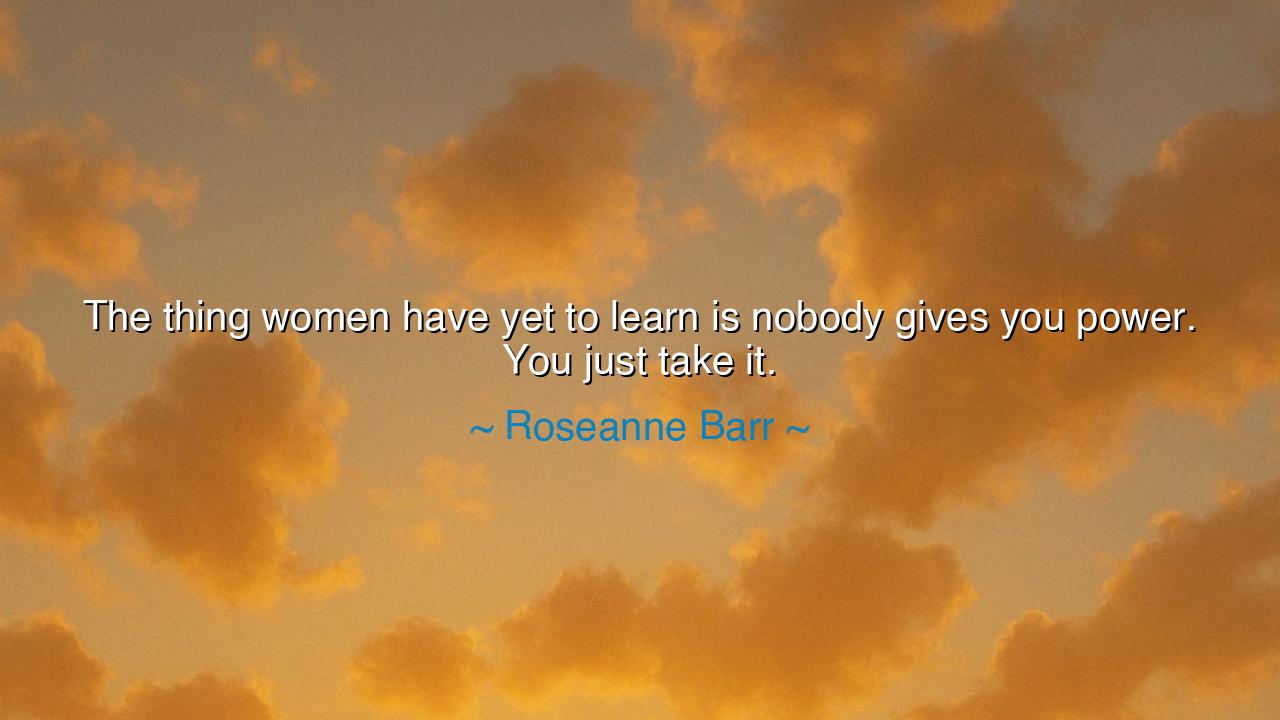
The thing women have yet to learn is nobody gives you power. You






The words of Roseanne Barr, "The thing women have yet to learn is nobody gives you power. You just take it," are not merely the cry of one age, but the thunderous echo of all ages. They remind us that power is never a gift laid gently at the feet of the forgotten; it is seized, demanded, and wrested from the hands of those who would keep it locked away. For those who wait for permission shall wait until their bones are dust, but those who rise with fire in their hearts carve a throne for themselves among the mighty.
In the annals of history, recall the figure of Joan of Arc, a maiden who heard the call of heaven and dared to lead armies into battle. No king gave her command, no priest handed her authority. She seized it with her unwavering faith and her fearless spirit. Clad not in silks but in armor, she stood before warriors who mocked her, and yet they followed. Her power was not granted; it was taken, and it changed the destiny of a nation.
So too, the suffragists of a more recent age—women who burned with the vision of equality—did not bow to kings, parliaments, or presidents. They chained themselves to gates, marched through hostile streets, endured hunger, and faced prison. The world did not wake one morning and bestow upon them the gift of the vote. They took it, through sacrifice, through fire, through unbreakable will.
Let it be known, then, to daughters yet unborn: do not linger at the doorway, waiting for the keepers of the keys to summon you inside. Power does not yield itself to patience, nor to politeness. It bends only to the hands that grip it firmly, to the voices that thunder without fear, to the spirits who refuse silence.
And if one doubts, remember this truth: all who hold power once took it from another. Kings seize crowns, empires rise upon conquest, prophets break idols to proclaim the divine. Why then should women be denied the same? The teaching is eternal: power is not granted—it is claimed, and those who dare to reach for it change the fate of the world.






Hhothihieu
I agree with Roseanne Barr’s sentiment that power isn’t handed over easily, but I also think it’s important to consider the context. In a world where women often face additional obstacles in leadership roles, how do we ensure that taking power doesn’t come at an unreasonably high personal or social cost? What steps can be taken to break down barriers so that women don’t feel like they must fight so hard just to be seen and heard?
UGUser Google
Roseanne Barr’s quote emphasizes agency and determination, but it might oversimplify the complexity of power dynamics. While it’s true that women can and should take control of their own lives and decisions, isn’t it also important to question why some women face greater challenges in taking power than others? How do systemic issues, such as gender bias and inequality, play into this process of ‘taking’ power?
HGph huong giang
The idea that women must ‘just take’ power resonates with the notion that empowerment comes from within. However, isn’t it also important to acknowledge that societal structures sometimes make it more difficult for women to claim power? Can women truly take power without facing intense resistance, and how can society shift to ensure that power is equally accessible to all, without requiring an individual to fight for it so fiercely?
BNBao Ngu
Roseanne Barr’s statement suggests that power is something women must actively claim rather than wait for. It’s a powerful sentiment, but I wonder: does this mindset reflect a harsh truth, or does it overlook the systemic barriers that prevent women from easily taking power? How do we balance the need for women to take power with the larger social structures that make it harder for them to do so?